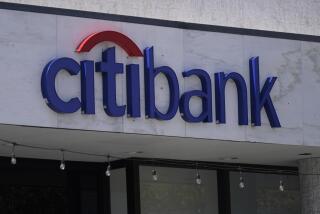GAO Cites Bank Lapses, Suspects Laundering
WASHINGTON â Financial services giant Citigroup Inc. and Commercial Bank of San Francisco violated control rules and allowed about $1 billion in possibly illicit Eastern European money to move through their accounts, congressional investigators say.
âThese transfers raise concerns that the U.S. banking system may have been used to launder money,â the General Accounting Office, Congressâ investigative arm, said in a report dated Oct. 31 on its nine-month inquiry. It was made available to Associated Press on Wednesday.
The report is just the latest allegation of large-scale international money laundering, which has received increased notice after it was revealed last year that the Bank of New York had served as a conduit for $7 billion in Russian money, some of it believed to be from criminal activities.
New York-based Citibank came under congressional scrutiny a year ago for alleged abuses by some executives in handling millions of dollars deposited by foreign officials later accused of corruption and money laundering.
Citibank on Tuesday sent a letter to the GAO saying it had closed the accounts in question after being contacted by congressional investigators earlier this year.
âIt is clear in hindsight that our systems and tracking procedures were not sufficient to detect the nature and extentâ of a clientâs relationship with the bank, wrote Michael Ross, general counsel of the bankâs Global Consumer Business division.
The client, Russian immigrant Irakly Kaveladze, set up more than 2,000 corporations registered in Delaware for Russian brokers and then opened Citibank accounts for them, according to the GAO report.
The conclusions of the report and Rossâ letter were first reported Wednesday by the New York Times and the Wall Street Journal.
Citigroup spokesman Michael Schlein said Wednesday the company would have no further comment. âThe letter speaks for itself.â
The GAO report said the president of Commercial Bank of San Francisco told the investigators that two Russians bought about 9% of its stock for $1 million in March 1995.
Rob Fuller, until recently the chief executive of Commercial Bank, said the bank closed or froze the accounts last year âbecause we werenât comfortable with our relationship with them.â
Last year the Federal Deposit Insurance Corp. signed a memorandum of understanding with Commercial Bank requiring it to tighten its internal controls.
More to Read
Inside the business of entertainment
The Wide Shot brings you news, analysis and insights on everything from streaming wars to production â and what it all means for the future.
You may occasionally receive promotional content from the Los Angeles Times.









